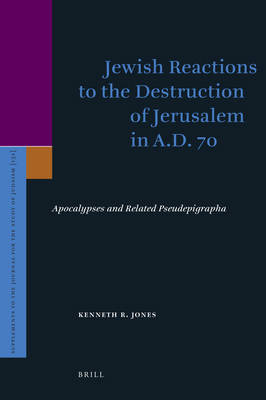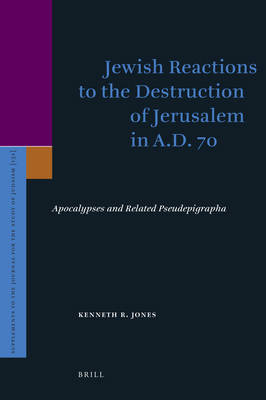
- Afhalen na 1 uur in een winkel met voorraad
- Gratis thuislevering in België vanaf € 30
- Ruim aanbod met 7 miljoen producten
- Afhalen na 1 uur in een winkel met voorraad
- Gratis thuislevering in België vanaf € 30
- Ruim aanbod met 7 miljoen producten
Zoeken
Jewish Reactions to the Destruction of Jerusalem in A.D. 70
Apocalypses and Related Pseudepigrapha
Ken Jones
€ 280,95
+ 561 punten
Omschrijving
The Roman destruction of Jerusalem in A.D. 70 was a watershed event in the religious, political, and social life of first-century Jews. This book explores the reaction to this event found in Jewish apocalypses and related literature preserved among the Pseudepigrapha (4 Ezra, 2 Baruch, 3 Baruch, 4 Baruch, Sibylline Oracles 4 and 5, and the Apocalypse of Abraham). While keeping the historical context of their composition in mind, the author analyzes the texts with a view to answering the following questions: What do these texts tell us about Jewish attitudes toward the Roman Empire? How did Jews understand the situation in post-70 Judea through the lens of Israel's past, especially the Babylonian sack of Jerusalem in 587 B.C.?
Specificaties
Betrokkenen
- Auteur(s):
- Uitgeverij:
Inhoud
- Aantal bladzijden:
- 320
- Taal:
- Engels
- Reeks:
- Reeksnummer:
- nr. 151
Eigenschappen
- Productcode (EAN):
- 9789004210271
- Verschijningsdatum:
- 20/09/2011
- Uitvoering:
- Hardcover
- Formaat:
- Genaaid
- Afmetingen:
- 170 mm x 244 mm
- Gewicht:
- 657 g

Alleen bij Standaard Boekhandel
+ 561 punten op je klantenkaart van Standaard Boekhandel
Beoordelingen
We publiceren alleen reviews die voldoen aan de voorwaarden voor reviews. Bekijk onze voorwaarden voor reviews.








